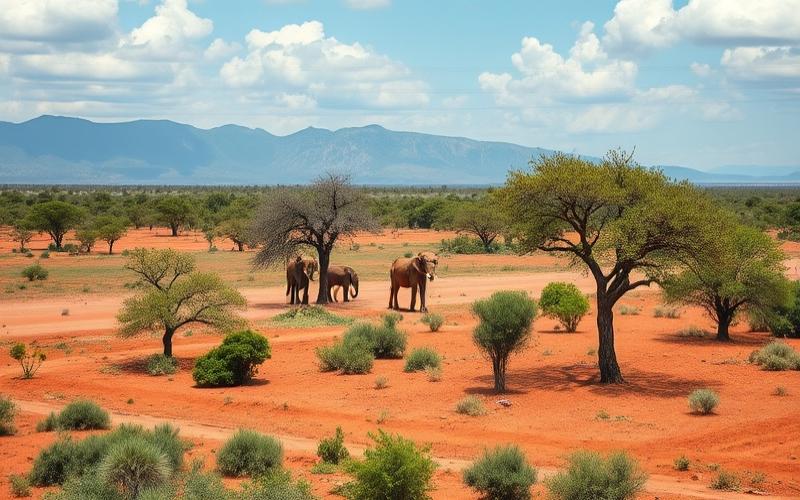
 Published on and written by Cyril Jarnias
Published on and written by Cyril Jarnias
Traveling abroad with your pet is an adventure full of challenges, especially when it comes to South Africa, a country with breathtaking landscapes and exceptional biodiversity. Navigating the legal and logistical requirements can prove complex, but bringing a piece of home with you makes expatriation much more rewarding.
Between the rigorous administrative formalities and advice for ensuring your companion’s well-being, this article guides you so your pet’s arrival on South African soil goes smoothly.
Whether you’re already sold on the idea of discovering Kruger National Park alongside your faithful companion or still questioning the feasibility of this project, we offer practical and tailored solutions to make this transition a smooth success.
Administrative and Health Procedures for South Africa
To import a pet into South Africa, there are strict health and administrative procedures to follow to ensure national health security and animal welfare.
Health Procedures and Veterinary Requirements
- Mandatory Vaccinations :
- Mandatory rabies vaccine for dogs and cats, administered from 3 months old. The vaccination certificate must be current and presented upon entry.
- For dogs, specific blood tests may be required depending on the country of origin.
- Quarantine :
- Some animals may be subject to a 60-day quarantine upon arrival, depending on their origin or if documentation is incomplete.
- If all conditions are met and the animal comes from a low-risk country, quarantine may not be mandatory.
- Required Documentation :
- Original veterinary health certificate, written in English, issued by a licensed veterinarian in the country of origin shortly before departure.
- Original, up-to-date vaccination record.
- Rabies vaccination certificate.
- Veterinary Import Permit (VIP) issued by South African authorities before departure.
- Other documents as applicable: indemnity declaration, CITES permit for protected species, etc.
| Required Document | Issuance / Remarks |
|---|---|
| Import Permit | Issued by the Directorate of Animal Health |
| Health Certificate | By a licensed veterinarian from the country of origin |
| Vaccination Record | Mandatory, current, with rabies vaccine |
| Rabies Certificate | Original, dated and signed |
| CITES Permit (if applicable) | For protected species |
Entry Administrative Formalities
- Permit Application :
- Fill out the official form specific to the species (available on the South African Department of Agriculture website).
- Send the application with supporting documents to the Directorate of Animal Health in Pretoria (official address to be used).
- The permit must be obtained before departure, otherwise the animal risks being refused entry or placed in quarantine.
- Upon Arrival :
- Present all original documents to the control veterinarian at the border or airport.
- Animals must travel in the cargo hold as “Manifest Cargo”.
Local Legislation and Restrictions
- Permitted Species :
- Dogs and cats are the most commonly accepted.
- Certain exotic species, birds, or rodents may require additional permits.
- Prohibited or Regulated Breeds :
- Certain dog breeds considered dangerous may be prohibited or subject to strict restrictions.
- It is imperative to check the list of affected breeds before departure.
Practical Tips for Preparing the Journey
- Before Departure :
- Schedule an appointment with a veterinarian for required exams, vaccinations, and to obtain necessary certificates.
- Plan for electronic identification (microchip) of the animal, recommended for traceability.
- Use an approved transport crate, suitable for the animal’s size and comfort.
- Book transport as cargo (Manifest Cargo) and not in the cabin or as standard checked baggage.
- During the Journey :
- Place familiar items (blanket, toy) in the transport crate to reassure the animal.
- Ensure hydration before boarding and avoid feeding just before the flight.
- Plan arrival outside of weekends or holidays to guarantee the presence of a control veterinarian upon arrival.
- Upon Arrival :
- Anticipate the possibility of quarantine and inquire about available facilities.
- Keep all original documents readily accessible.
Important: Any irregularity in documentation or non-compliance with procedures may result in the animal being sent back or placed in extended quarantine.
To travel with a pet to South Africa:
- Apply for and obtain an import permit before departure
- Prepare a complete file including: health certificate, vaccination record, rabies certificate
- Check restrictions on breeds and species
- Plan for possible quarantine
- Arrange transport as Manifest Cargo
- Ensure the animal’s well-being throughout the process
Good to Know:
To enter South Africa with a pet, a veterinary health certificate and an up-to-date vaccination record, including rabies, are required, along with an import permit; certain breeds may be subject to restrictions or prohibitions. Ensure you properly prepare your pet for the journey by checking quarantine requirements and planning regular breaks for their comfort during the trip.
Secure Transport of Pets
Specific Regulations for South Africa
- Mandatory Rabies Vaccination: all dogs and cats must be vaccinated at least 30 days (and at most one year) before their arrival, unless they come from the UK, Australia, or New Zealand.
- Required Import Permit: to be requested from the South African Directorate of Animal Health. This permit is mandatory even for domestic pets from neighboring countries.
- Veterinary Health Certificate: issued by a licensed veterinarian in the country of origin after examination and tests (blood tests for dogs).
- Administrative Procedure :
- Fill out the official form according to the animal type and submit to Pretoria.
- Forms are available from the South African Department of Agriculture.
| Requirement | Detail |
|---|---|
| Rabies Vaccination | Mandatory outside UK/Australia/NZ; strict timeframe |
| Import Permit | Must be obtained before departure |
| Health Certificate | Issued by veterinarian + tests |
| Quarantine | Possible depending on origin or specific health situation |
Options for Secure Transport
- Airlines Accepting Animals
- Delta, Air Austral, Air Transat offer different options: cabin (PETC), cargo hold (AVIH/cargo), with IATA-approved crates.
- Some airlines prohibit transport of particular breeds or exotic/venomous animals.
- Specialized Services
- Professional companies specializing in international animal transport, managing formalities, airport logistics, and real-time tracking.
Practical Tips for Preparing the Animal
Before the Journey:
- Gradually acclimate your pet to its IATA-approved transport crate: short sessions then extended ones several weeks before departure.
- Reduce food about six hours before boarding but allow free access to water until the last moment.
- Place a blanket or familiar object in the crate to reassure the animal.
Stress Management:
- Encourage physical exercise a few hours before departure so the animal is calm during the flight.
- Avoid sedatives without veterinary advice: they can present more risks than benefits during a pressurized flight.
Insurance & Tracking
List of commonly offered options:
| Service | Description |
|---|---|
| Pet Travel Insurance | Covers unforeseen veterinary costs/damages/loss |
| Electronic Tracking | Some companies offer tracking via SMS/email/dedicated web platform |
Always contact your airline or specialized service to know their specific offers regarding insurance/tracking throughout the journey.
Specific Considerations – Exotic Animals
Venomous reptiles/venomous insects are prohibited on some routes. Birds also face strong restrictions (example: only parrots/parakeets allowed on certain routes). A CITES permit may be necessary if your animal belongs to a protected species. Always check beforehand with the competent South African authorities and with the chosen carrier.
Feedback and Expat Testimonials
“We used a specialized agency that handled all the administrative steps… Our cat traveled calmly thanks to the advice received regarding its gradual acclimation to its crate.”
“The administrative process is long but effective if anticipated sufficiently… Arrival in South Africa went well because all our documents were compliant.”
- Regularly consult official sites like that of the South African Department of Agriculture.
- Contact your embassy/consulate which can provide updated forms.
- Reach out as soon as possible to a recognized professional service if you wish to delegate all logistical procedures.
Good to Know:
Ensure your pet is up to date with its vaccines and microchip for entry into South Africa, and consider airlines like KLM or Emirates that accept pets in the cabin; consult specialized services for insurance and tracking options to ensure secure transport.
Animal Adaptation to the New South African Environment
Pets encounter in South Africa a varied climate, with seasons reversed compared to Europe, temperatures ranging from 8°C in winter to over 28°C in summer depending on the region. Some places like Cape Town experience strong winds, while others may face sudden storms or increased humidity.
Main Environmental Differences for Animals:
- High summer temperatures that can exceed 30°C in some regions.
- Mild but sometimes humid or windy winters.
- Presence of new potentially toxic plants and unfamiliar insects (ticks, mosquitoes, snakes).
- Variation in day/night rhythm and seasonal change that can disrupt biological routine.
Behaviors to Watch Indicating Stress or an Environment-Related Problem:
- Lethargy, loss of appetite, or unusual agitation.
- Excessive scratching or hair loss (allergies to local plants or insect bites).
- Frequent panting, excessive seeking of shade (heat overload).
- Digestive issues related to dietary change.
Practical Tips to Facilitate Acclimation:
Gradual Acclimation:
- Gradually increase the duration of outdoor outings to acclimate the animal to the local climate.
- Provide constant access to fresh water and shade outdoor spaces during hot hours.
Hygiene:
- Regularly inspect the coat to detect ticks and local parasites.
- Frequently clean paws and coat after each outing to limit allergies and plant poisonings.
Adapted Nutrition:
- Adjust the ration according to the activity level increased/decreased by the local climate.
Recommended Vaccines & Treatments:
| Disease | Vaccine/Treatment | Remarks |
|---|---|---|
| Rabies | Mandatory vaccine | Strict control throughout the country |
| Parvovirus | Recommended vaccine | Increased risk in urban areas |
| Tick/Mosquito | Antiparasitics | Prevention against babesiosis & vector-borne diseases |
| Leishmaniasis | Preventive treatment | In certain specific regions |
Other Important Recommendations:
Systematically consult a local veterinarian upon your arrival to obtain a comprehensive assessment of specific regional risks (endemic diseases, dangerous local wildlife).
List of Essential Points During the Veterinary Appointment:
- Verification of the vaccination record according to South African regulations
- Advice on local nutrition
- Information on outdoor spaces permitted for animals
- Local rules regarding walking/animal keeping
Consulting a regional professional allows for a smooth adaptation while respecting South African legislation.
Good to Know:
Owners should monitor signs of stress in their pets facing climatic and ecological variations in South Africa, such as excessive licking or changes in appetite, while ensuring they receive appropriate vaccines and consulting a local veterinarian for precise recommendations.
Animal Services and Cultural Considerations in South Africa
The variety and availability of animal services in South Africa are generally high in urban centers, where you can find:
- Private veterinarians and specialized clinics (surgery, dermatology, preventive medicine)
- Pet boarding facilities (temporary accommodation during travel or vacations)
- Dog walking services
- Grooming salons with standard and premium options
In rural areas, the number of veterinarians is more limited; paraprofessional veterinarians are often used to compensate for this lack. Access to care can therefore vary depending on geographic location.
| Type of Service | Urban Area | Rural Area |
|---|---|---|
| Graduated Veterinarian | Very common | Rare |
| Paraprofessional | Less frequent | Common |
| Animal Boarding | Wide choice | Limited options |
| Grooming | Numerous salons | Often absent |
| Dog Walking | Specialized services | Local initiative |
Regulations on Importation and Animal Welfare
The regulations on importation and animal welfare are strict:
- Mandatory veterinary import permit before any movement.
- Complete health examination required; international certificate necessary.
- Mandatory rabies vaccination from 3 months for imported puppies and kittens.
- Some animals or products may be subject to quarantine or additional controls depending on their origin.
Important specifics for expatriates:
- Administrative procedures are precise (specific forms to fill out).
- Animals must travel as separate baggage, not as ordinary excess.
The legislation primarily aims to limit the introduction of diseases such as rabies.
Animal Welfare
Regarding animal welfare, several national initiatives rely on the “One Health” system, which coordinates human, animal, and environmental health. This approach promotes comprehensive animal welfare care but also highlights persistent challenges: lack of qualified personnel outside major cities and the need for continuous improvement of the professional network.
Cultural Considerations Around Domestic Animals
The cultural considerations around domestic animals vary greatly:
List of main sociocultural attitudes:
- In the urban English-speaking/white population: marked attachment to domestic animals (dogs/cats considered family members).
- In some traditional groups: more functional relationship with the animal (guarding, hunting), sometimes less focused on modern emotional well-being.
This can influence the experience of an expatriate arriving with an animal accustomed to a high level of attention or requiring specialized services.
Observed traditional practices:
- Traditional use of dogs as guardians in some rural communities
- Frequent lack of access to professional grooming outside metropolitan areas
- Variable sensitivity towards systematic sterilization or vaccination
Useful Local Resources
To facilitate integration with an animal in South Africa, there are several useful local resources:
List of local resources:
- Urban canine clubs offering sports activities/gatherings
- Feline associations organizing exhibitions/advice workshops
- Facebook/WhatsApp groups dedicated to expatriate owners seeking logistical/veterinary/location of reliable boarding assistance
- Local organizations like SPCA offering practical information and support
To ensure your companion’s well-being in South Africa while adapting to the local context, it is recommended for expatriates to anticipate administrative procedures related to importation as well as cultural differences concerning animal ownership.
Occasional recourse to community groups often allows for better social integration for oneself as well as for one’s animal.
Good to Know:
Veterinarians and animal services are widely available in South Africa, but regulations on animal importation are strict and require quarantines. Attitudes towards pets vary, sometimes influencing the attention given to animals, so expatriate groups and local clubs can offer valuable support.
Disclaimer: The information provided on this website is for informational purposes only and does not constitute financial, legal, or professional advice. We encourage you to consult qualified experts before making any investment, real estate, or expatriation decisions. Although we strive to maintain up-to-date and accurate information, we do not guarantee the completeness, accuracy, or timeliness of the proposed content. As investment and expatriation involve risks, we disclaim any liability for potential losses or damages arising from the use of this site. Your use of this site confirms your acceptance of these terms and your understanding of the associated risks.
























































